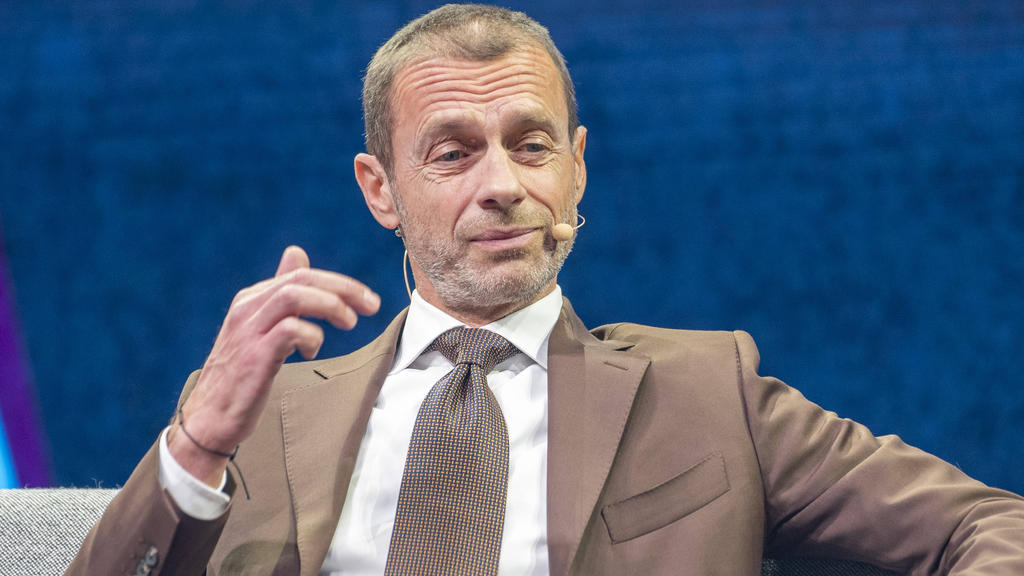Ceferin won't seek re-election in 2027

Aleksander Ceferin said Thursday he would not seek a fourth term as UEFA president in 2027 despite the approval of controversial reforms that would allow him to extend his mandate.
"I decided around six months ago that I'm not planning to run in 2027 anymore," the 56-year-old Slovenian lawyer said at a press conference following the UEFA Congress in Paris.
"The reason is that after some time, every organisation needs fresh blood, but mainly because I was away from my family for seven years now."
Ceferin also said he was "tired of Covid, tired of two wars" and of plans for a rival Super League that he called a "nonsense project".
His surprise announcement came shortly after UEFA member nations voted overwhelmingly in favour of a series of statute amendments, including a measure that would have let Ceferin potentially stay in his role until 2031.
"I intentionally didn't want to disclose my thoughts before, because firstly, I wanted to see the real face of some people and I saw it," said Ceferin, first elected in 2016 following the downfall of Frenchman Michel Platini.
"I didn't want to influence the Congress. I wanted them to decide (on the statutes) not knowing what I'm telling you today."
The key amendment passed does not erase the three-term limit but stipulates that terms of office started or served before July 1, 2017, shall not be taken into account.
The rule was introduced by Ceferin that year as an anti-corruption move in the wake of the FIFA scandal. He said the need to change the existing legislation stemmed from the fact it had not been properly implemented at the time.
Ceferin was re-elected unopposed for a third term last April, just weeks after Gianni Infantino was re-elected as president of the sport's world governing body FIFA.
However his suggestion he could run for a fourth term, which arose during an executive meeting in December, prompted UEFA's chief of football Zvonimir Boban to resign last month.
The former Croatia midfielder, who was part of AC Milan's successful sides in the 1990s, called it a "disastrous idea".
Ceferin took a parting shot at Boban, formerly a close ally, criticising his "narcissistic whining" and "pathetic cry about morality".
The motion comfortably received the two-thirds majority required during Thursday's vote, with England the lone dissenting voice among the 55 member nations. Ukraine abstained.
Ceferin hit back at claims that his organisation, which has had to fight off the threat of the breakaway Super League, was crumbling under his leadership.
"UEFA is divided I've read, UEFA is fragmented beyond repair I've read. I hope that, I'm probably naive, the ones who claim that are a bit embarrassed now after this vote," he said.
Among a number of other statute changes voted for as a block of measures, which the English FA also opposed, was a proposal guaranteeing greater female representation on UEFA's ruling executive committee.
An age limit of 70 for all members of that committee was repealed as well.
Twenty-six European countries signed a joint declaration Thursday voicing their opposition to the Super League, although Spain was a notable absentee from that list.
Spanish giants Real Madrid and Barcelona are still publicly attached to the project, which sent shockwaves through the sport when 12 of its biggest clubs announced they had signed up to the competition in April 2021.
However, within 48 hours nine of the 12 rebel clubs -- including six from the English Premier League -- backed down and the project collapsed.
Ceferin took another swipe at those behind the Super League as he addressed the Congress, likening it to "Snow White's poisoned apple".
"There is strength in unity, and unity is the only thing that can save us," said Ceferin.
"Today, a few individuals are trying to divide us in the name of the free market, driven by an insatiable desire to generate ever-increasing profits for the privileged few.
"I know some supporters are critical about us, about FIFA, which is normal. Anti-institution and anti-establishment sentiment is rife.
"But we take it on the chin. Because we know what we stand for. We stand for an ideal; a fragile balance between opposing interests. And that comes at a price."







